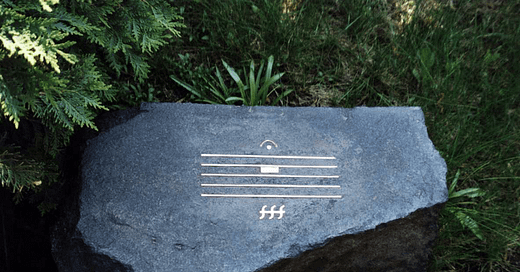I started writing this before news broke of the death of Pope Francis. if his passing is as a loss to you, my heart goes out to you.
mourning the dead
I was sitting at the table, pondering the church’s celebration of Holy Saturday.
not Good Friday when Jesus was crucified, and not Easter when he rose from the dead, but the Saturday—when Jesus lay dead in a tomb carved from stone, wrapped in burial cloth with myrrh and aloe.
in a moment like this, when someone of great influence in our human story leaves us to finish it out, something in us rises that desires to dignify their life—to draw attention to the potency their life embodied. we build memorials and statues, we grieve, we write eulogies, we sing dirges, we celebrate, we cry, and we remember them with tears and laughter.
music is no great stone memorial. and yet we sing hymns at a funeral in honor of the one person whose mortal ears no longer hear our song. we decorate the time of their passing with melody…
and why?
why make something beautiful? especially when a beloved comes to the dreaded end…
to make beauty in moments like these is to transcend the confines of our mortality. it is to participate in the divine nature of a God whose essence is overflow inexhaustible, endlessness, whose creative energy is expressed in the totality of the cosmos… even in the intelligence bestowed on us to contemplate the nature of reality, our human nature, and the nature of God himself.
to write songs, even wordless songs, is to lean into the lilt of music that goes out and beyond our lives. we die. our bodies wither, fail, and fall—dust to dust, ashes to wind.
yet something in us is made of the other stuff—the aether1 that moves us in the lilt of an Irish fiddle melody, and calls forth the resonance in us that knows—we possess in ourselves this eternal glow of life.
we can quiet it. we can tell it to love what we think it should love. but its beloved is the transcendent God, who is its source. we resonate because he sounds. we love because he first loved us2.
to mourn the dead is to ritually give honor both to death and to life—theirs and ours. we share in the same waterway, having begun as a soft rain and ending with a rushing out into the delta. when we remember the dead as they pass, we say that life is a brief enterprise—how piteous are our short days beneath the sun! and we also say that life is the cresting wave caught in the glassy illumination of sunset—how glorious and ephemeral, the casting up of the waves of our lives on the shore of life—let us make the shoreline laugh and sing!
many of us are afraid of death. and so we neither participate in honoring the loss, nor the glory. but these forces are irrevocable—they act on us. loss and glory are inescapable. but we rob ourselves when we, as a culture, push away death.
the culture that worships youth is based in the fear of death. and when we are afraid of death, we turn away old age. and when we do, we turn away from the wisdom of our elders in an effort to get what may be gotten of pleasure now. and with many other means we indulge and distract ourselves, thinking we will stave off the haggard face of death.
death is not comfortable. but in our attempts to reject it, by ignoring it and hoping it will go away, we forfeit the shared value we can hold for aging, for wisdom, for elderhood. when we embrace discomfort, we embrace vulnerability. and practicing vulnerability is how we see one another.
anyone who has forsaken an hedonic/materialist view—that death is pain, pain is to be avoided, and so let us get pleasure, and pretend to be (and look) young when we are not—has realized that out beyond our vanity fair is a world rich to explore, with trials and learning and adventures (some of which no one will see, and yet still enriches us)… and it is filled with those who have passed through the water and the fires, who have scaled the highest peak, who have lost and learned how to recover.
we can’t learn this quickly, as individuals or as a culture. time and our losses are the moments when we can learn a new way. and maybe we can’t learn to embrace this kind of ritual social pain without a clear north star to guide us.
but when we fix our eyes on the shining light of a god who condescended3 into the lowliness of our human nature, who surrendered himself to our deaths, to our suffering, and who brought up with his divine nature our human nature, passing with it from the mortal into the eternal, we have before us his guiding polestar.
the loving, the healing, the suffering, the self-offering death, the transcendence of death into life again—we renew our attention on the image of the God-man, Jesus, as he gave himself to us and for us. and by him we may participate in the love-pain of death, and in its rallying cry, that death is merely the ending of the notes we are given to sing in our mortality as we decorate the praises of God through the gifts of creation and of our time, that crescendo and echo in the endlessness of eternity.
“above is the gravestone of Soviet-German composer Alfred Schnittke (1934-1998). it’s a musical staff with a semibreve (the center bar) indicating a rest or pause in the music. the fermata (the half circle + dot at the top) indicates to hold the note (in this case the rest) as long as desired. the note should then be performed fortississimo (the three f’s at the bottom), meaning it should be performed extremely loudly/strongly. so it’s essentially an extremely loud/strong silence (rest) to be held as long as desired.” (source)
such ran my thoughts as I sat at the table, and wrote them here to share. I hope they stir some thoughts of your own.
in closing, I wanted to share a related, and belated, Easter-adjacent poem from a forthcoming collection:
a belated Easter poem
when the king of kings says
show me where the lowest of the low
are born, passing into life from the body
of a woman with nothing to give me
but herself—behold how majesty
sets up his throne
in the womb of woman
in the hands of the midwife
on the bosom of motherhood
when the king of kings says
show me where the suffering
hide their eyes under the heaviness of shame
laboring under the burden of sickness
and behold how majesty
sets up his throne
in the mind of the demonized
in the skin of the leprous
when the king of kings says
show me where they take the thieves,
the murderers, the lawbreakers of our people
and transfix them into hanging curses
stripped of all dignity there
behold how majesty
sets up his throne
on the hooks of the lash
in the spit and slurs of the accusers
in the company of the condemned
when the king of kings says
show me where they lay the dead,
those cut off from the light of life
where darkness reigns and decay feasts
until all memory of them has been expunged
from the living—behold how majesty
sets up his throne
in a pit of earth
within the mouth of Hades
within the trembling hand of Death itselfthanks for being here. I write weekly sharing poetry, songs, musings, thoughts on creative life, and hopefully some encouragement… my first collection of poetry, Snowmelt to Roots, is available in my shop, (or on Amazon). and my music is available here.
tour info is here (with shows coming up in CA).
peace,
Z
from this passage
using it in this sense = “to bend down/stoop low”





